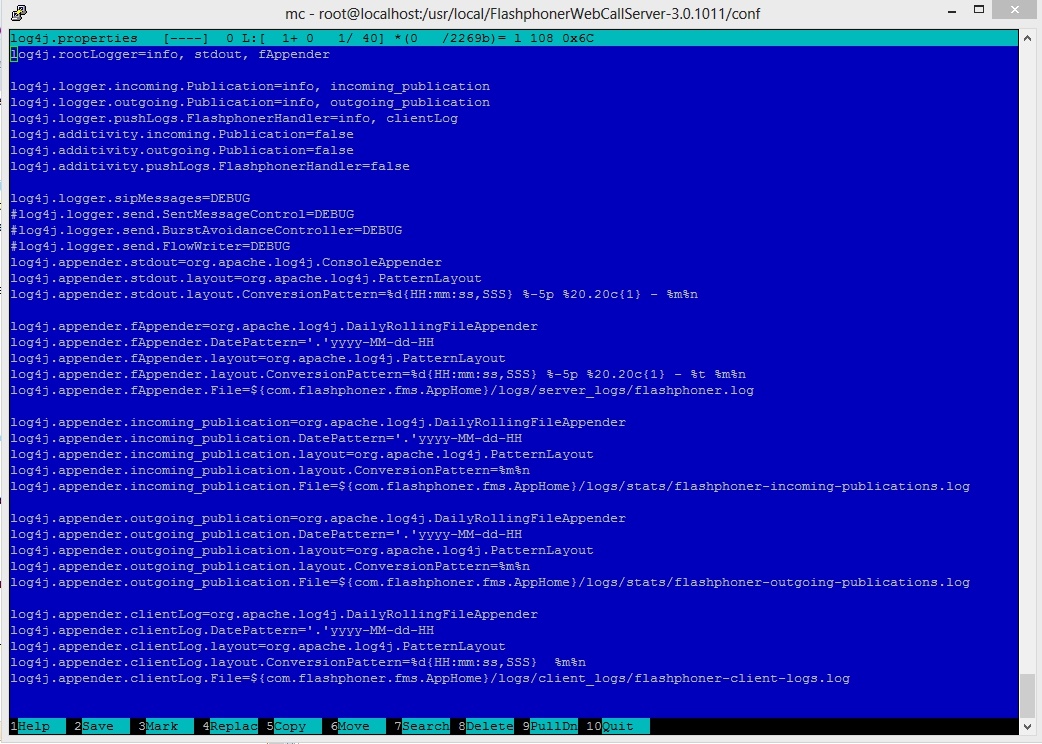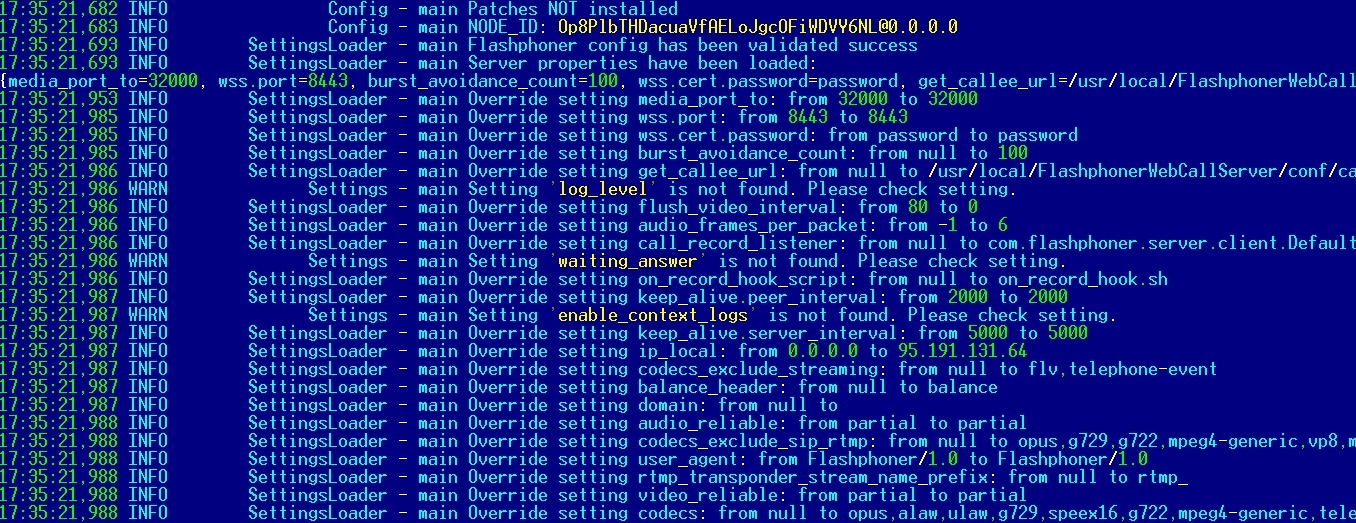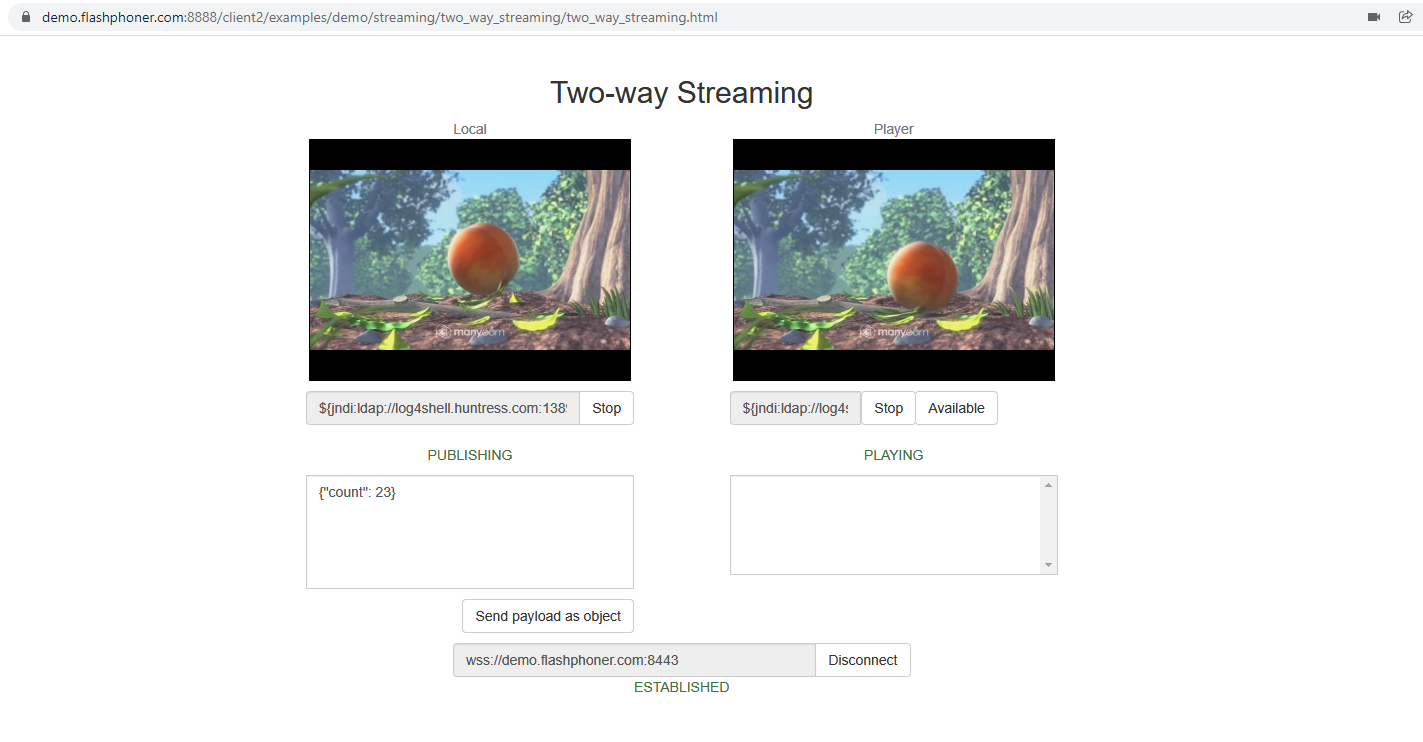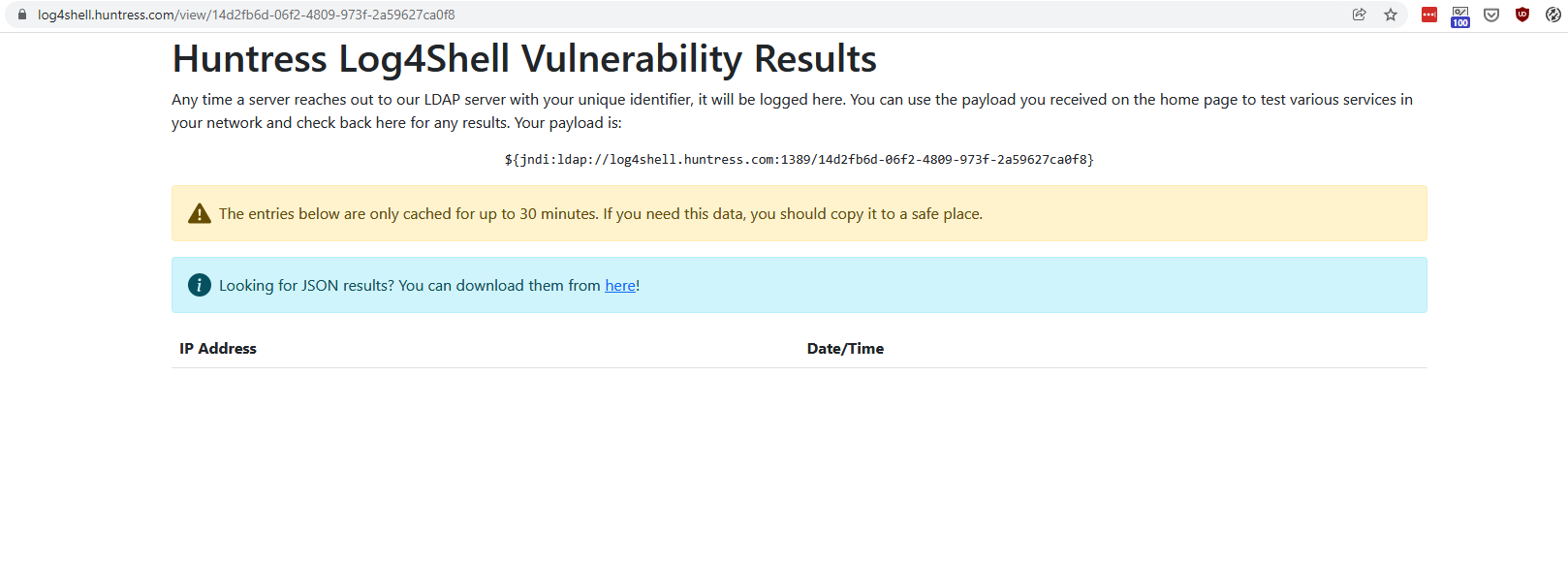Logging settings
WCS Core logging is handled by the log4j.properties config and a number of settings in flashphoner.properties:
Logging settings in flashphoner.properties
Setting | Default value |
|---|---|
client_log_level | INFO |
client_dump_level | 0 |
enable_extended_logging | true |
Logs are recorded to /usr/local/FlashphonerWebCallServer/logs
- client_logs - logs recorded on the server side that correspond to the WCS server client session (client logs).
- server_logs - general logs recorded on the server side.
Logging settings in log4j.properties
This is a standard config of the log4j format.
Settings description
Attribute | Value | Description |
|---|---|---|
log4j.rootLogger | info, stdout, fAppender | Root logger. info - INFO logging level. More detailed levels, for example, DEBUG and TRACE, and less detailed, for example, ERROR are available. stdout, fAppender - set how and where logs are output. |
log4j.logger.incoming.Publication | info, incoming_publication | RTMFP-SIP calls statistics logger for the traffic incoming from a SIP server. info - logging level |
log4j.logger.outgoing.Publication | info, outgoing_publication | RTMFP-SIP calls statistics logger for the traffic outgoing to a SIP server. info - logging level |
log4j.logger.pushLogs.FlashphonerHandler | Not used | Not used |
log4j.additivity.incoming.Publication | false | Do not add these logs to the general log, recording them as individual logs instead |
log4j.additivity.outgoing.Publication | false | Do not add these logs to the general log, recording them as individual logs instead |
log4j.logger.sipMessages | debug | Put inbound and outgoing SIP messages to the log |
| log4j.logger.WSServerHandler | trace | Put outgoing Websocket messages to the log |
| log4j.logger.WSClient | debug | Put incoming Websocket messages to the log |
log4j.appender.stdout | org.apache.log4j.ConsoleAppender | Output logs to stdout |
log4j.appender.fAppender | org.apache.log4j.DailyRollingFileAppender | Output logs to fAppender |
log4j.appender.incoming_publication | org.apache.log4j.DailyRollingFileAppender | Output RTMFP statistics to incoming_publication |
log4j.appender.outgoing_publication | org.apache.log4j.DailyRollingFileAppender | Output RTMFP statistics to outgoing_publication |
log4j.appender.clientLog | org.apache.log4j.DailyRollingFileAppender | Not used |
Logging settings hot swapping
WCS automatically catches changes made to the log4j.properties file. This is convenient for debugging purposes and to receive additional logs without restarting the server. For instance, when you need to enable more detailed logs and change the output format of logs. However, for higher reliability during production, we recommend restarting the WCS server nevertheless.
Websocket messages tracing
For debugging purpose, or to develop your own API, all Websocket messages tracing except transport ones may be enabled. To log all incoming\outgoing Websocket messages to websocket.log file in /usr/local/FlashphonerWebCallServer/logs/server_logs directory, the following strings should be added to log4j.properties file:
log4j.logger.WSServerHandler=trace, wsAppender
log4j.logger.WSClient=debug, wsAppender
log4j.appender.wsAppender=org.apache.log4j.DailyRollingFileAppender
log4j.appender.wsAppender.DatePattern='.'yyyy-MM-dd-HH
log4j.appender.wsAppender.layout=org.apache.log4j.PatternLayout
log4j.appender.wsAppender.layout.ConversionPattern=%d{HH:mm:ss,SSS} %-5p %20.20c{1} - %t %m%n
log4j.appender.wsAppender.File=${com.flashphoner.fms.AppHome}/logs/server_logs/websocket.log
Client logs
Switching on, off and managing logging level
Client logs are logs on the server that are relevant to a web client session. Client logs are only recorded to client_logs if the enable_extended_logging=true setting is enabled (by default)
enable_extended_logging=true
To switch client logging off the following should be set in flashphoner.properties file
enable_extended_logging=false
You can configure the logging detail level using the client_log_level setting that can assume the following values: ERROR, INFO, DEBUG, TRACE. By default
client_log_level=INFO
It is recommended to use cron in conjuction with find to periodically purge client logs. For example, to check for outdated logs every 24 hours and delete all logs older than 30 days add the following cron task
0 0 * * * find /usr/local/FlashphonerWebCallServer/logs/client_logs/ -type d -mtime +30 | xargs rm -rf
Logging level managing "on the fly"
Logging level for certain session may be changed on the go, without server restart. To do this, REST queries are used
REST query should be HTTP/HTTPS POST request such as:
- HTTP: http://test.flashphoner.com:8081/rest-api/logger/enable_client_log
- HTTPS: https://test.flashphoner.com:8444/rest-api/logger/enable_client_log
Here:
- test.flashphoner.com is WCS server address
- 8081 is WCS standard REST / HTTP port
- 8444 is WCS standard HTTPS port
- rest-api is required URL prefix
- /logger/enable_client_log is REST method used
REST methods and response statuses
REST method | Example of REST request | Example of REST response | Response status | Description |
|---|---|---|---|---|
/logger/enable_client_log | {
"sessionId": "/127.0.0.1:57539/192.168.1.101:8443",
"logLevel": "DEBUG"
}
| 200 - Logging level is changed 404 - Session not found | Set the logging level specified in session specified | |
/logger/disable_client_log | {
"sessionId": "/127.0.0.1:57539/192.168.1.101:8443"
}
| 200 - Logging is disabled 404 - Session not found | Fully disable logging in session specified |
Parameters
Parameter name | Description | Example |
|---|---|---|
sessionId | Session Id | /127.0.0.1:57539/192.168.1.101:8443 |
logLevel | Logging level to set | DEBUG |
Thus, when problem occurs with stream published on server (for example, the stream is published but cannot be played), REST query should be sent to server to switch logging level to DEBUG and then, when problem is reproduced and data are collected, to switch logging level back to INFO. Also it is possible to switch logging off in certain client session.
Logging level changes with REST queries affects only the session specified, but not another sessions including sessions that will be created later.
Enabling debug log for all the client sessions
To diagnose a problem, sometimes it is necessary to enable debug logging for all newly connected client sessions, to write to client logs connection establishing process and stream publishing start. This feature can be enabled since build 5.2.512 with the following parameter
client_log_force_debug=true
For all newly connected clients debug logs will be recorded during interval defined with the following parameter in seconds
client_log_force_debug_timeout=60
By default client debug logs will be written in 60 seconds for each session connected.
These settings can be changed win CLI and applied without server restart.
Using flight recorder
Flight recorder function allows to cyclically write some latest events for stream published. This information may help to diagnose problems with stream publishing without full client debug logs enabling. Flight recorder is enabled with the following parameter in flashphoner.properties file
enable_flight_recorder=true
It is necessary to set events category that will be written (defined by developer)
flight_recorder_categories=WCS1438
The events are written for publisher client to flight_recorder.log file, if stream publishing stops by some error, or stream is corrupted by some way.
To test flight recorder, the parameter should be set
enable_flight_recorder_test=true
without restarting WCS server. It saves the events to file for all publishers connected.
enable_flight_recorder_test parameter is not intended to use in productionClient logs tuning
Since build 5.2.2040 client logs output may be tuned at a certain logger level. The settings file client-log4j.properties is used to do that. A logger name and level are set in the file:
Session=INFO _com.flashphoner.media.AudioSession=INFO _com.flashphoner.media.VideoSession=INFO _com.flashphoner.media.MediaSession=DEBUG
The changes are applied on the fly, WCS restart is not required.
Client log structure and content
Client logs structure:
client_logs ---- 2018-05-16 -------- 84gij60a6u3ni7docsr1di1l5b-15-06-59 ------------ flashphoner.log ------------ client-84gij60a6u3ni7docsr1di1l5b-2018.05.16.15.07.26-1526458046646.report ------------ MediaDump-85d65b00-639e-4a7e.31002-31004-31006-31008.pcap
flashphoner.log log
Client logs are recorded to client_logs by dates. For each date, a directory is created with the name formatted as YYYY-MM-DD, for instance, 2018-05-16.
When the web client establishes connection to the server, a folder for the current client session is created inside the date folder, for example, 84gij60a6u3ni7docsr1di1l5b-15-06-59, where 84gij60a6u3ni7docsr1di1l5b is a session identifier, 15 is hours, 06 is minutes, 59 is seconds. In the same directory the flashphoner.log file is recorded, which contains only those server events that are relevant to this specific client session. Hence, we see when the client connected to the server, and what logs were recorded for this client's session.
client-report log
This is an additional client log. The web client has a special WCS JavaScript API function 'pushLog'. This function sends to the WCS server logs recorded on the browser side. All logs received from the web client using pushLog are saved on the server. When the web client ends a session with the WCS server, the received logs are recorded to the client-84gij60a6u3ni7docsr1di1l5b-2018.05.16.15.07.26-1526458046646.report file, where 84gij60a6u3ni7docsr1di1l5b is a session identifier, 2018 is year, 05 is month, 26 is day, 15 is hours, 07 is minutes, 26 is seconds, 1526458046646 is milliseconds.
Media traffic dumps
If in the flashphoner.properties settings file a non-zero value is set for the client_dump_level setting, a dump session is additionally recorded for a client:
- if client_dump_level=1, only SIP traffic is recorded;
- if client_dump_level=2, all media traffic is recorded.
Traffic is recorded using tcpdump, if this utility is installed in the system.
flight_recorder.log log
Last events for stream published are written to this file.
Server logs
WCS Core records general server logs to logs/server_logs
server_logs ---- flashphoner.log ---- flashphoner.log.2018-05-17-16
In these logs you can track start of the server and its starting settings:
tail -f flashphoner.log
Server startup
Shutting down the server
Licensing information:
Besides, REST hooks queries information is displayed in server logs:
08:01:06,649 INFO RestClient - API-ASYNC-pool-8-thread-2 SEND REST OBJECT ==>
URL:http://localhost:8081/EchoApp/StreamStatusEvent
OBJECT:
{
"nodeId" : "rR3YA7yKB11iIIID4XkYveTF8ePhezMU@0.0.0.0",
"appKey" : "defaultApp",
"sessionId" : "/5.44.168.45:58541/95.191.131.65:8443",
"mediaSessionId" : "58488550-99dd-11e8-bf13-9b5947c0a0f5",
"name" : "569a",
"published" : true,
"hasVideo" : true,
"hasAudio" : true,
"status" : "PUBLISHING",
"audioCodec" : "opus",
"videoCodec" : "H264",
"info" : "Unknown",
"record" : false,
"width" : 0,
"height" : 0,
"bitrate" : 0,
"minBitrate" : 0,
"maxBitrate" : 0,
"quality" : 0,
"timeShift" : -1,
"createDate" : 1533603665644,
"mediaProvider" : "WebRTC",
"history" : false,
"origin" : "https://test.flashphoner.com:8888"
}
Therefore, server logs offer general information about server operation. You can receive more detailed information in logs that are recorded individually for each client session.
CDR logs
Сall Detail Record is a SIP calls log.
CDR records are added to a log file located at logs/cdr/cdr.log. A new log file is created every 24 hours. Data are recorded as a CSV file, so they can be easily processed.
Field names are not recorded to the file.
Record format:
src;dst,cid,start,answer,end,billsec,disposition
Record example:
3000;3001;f294f6116bf2cc4c725f20457ed76e5b@192.168.56.2;2014-11-21 15:01:37; 2014-11-21 15:01:41; 2014-11-21 15:02:45;64;ANSWERED
Field | Description |
|---|---|
src | Caller |
dst | Callee |
cid | Call identifier |
start | Call start (date and time). |
answer | Date and time the call is answered by the subscriber or the SIP side. |
end | Date and time the call ended. |
billsec | Time in seconds between 'answer' and 'end'. |
disposition | Call result: ANSWERED, NO_ANSWER, BUSY, FAILED. |
MDR logs
Message Detail Record is a SIP messages log.
MDR records are added to a log file located at logs/cdr/mdr.log. A new log file is created every 24 hours. Data are recorded as a CSV file, so they can be easily processed.
Field names are not recorded to the file.
Record format:
date,msgId,from,to,disposition
Record example:
Fri Dec 26 15:26:16 NOVT 2014,null,A006,A005,RECEIVED
Field | Description |
|---|---|
date | Date and time of the message |
msgId | Message identifier. Is present only in message/cpim messages if isImdnRequired=true (see Web Call Server - Call Flow documentation, parameters of the passed messages in the sendMessage method are described there). |
from | SIP from |
to | SIP to |
disposition | Message result: RECEIVED, SENT, FAILED. RECEIVED - the message is received. SENT - the message is sent. FAILED - there were an error while sending the message. |
You can also gather any message statistics and their statuses you need using WCS REST API. See Web Call Server - Call Flow documentation that describes all methods and data sets that WCS sends via REST when it processes messages.
SDR logs
Stream Detail Record is a stream publishing and playing session logs.
SDR records are written to the sdr.log file located at logs/cdr. A new log file is created every 24 hours. Data are recorded as a CSV file, so they can be easily processed.
Field names are not recorded to the file.
Record format:
start;mediaProvider;name;mediaSessionId;duration;disposition;info;type;subscribers;
Record example:
2015-11-11 08:36:13;Flash;stream-Bob;5c2d75c0-7d87-421d-aa93-2732c48d8eaa;00:00:48;UNPUBLISHED;;PUBLISH;3;
Field | Description |
|---|---|
start | Date and time the session started |
mediaProvider | The media used in WCS JavaScript API: WebRTC, Flash |
name | Name of the published / played stream |
mediaSessionId | Media session identifier |
duration | Duration of the session |
disposition | Session result: UNPUBLISHED, STOPPED, FAILED UNPUBLISHED - publishing of the stream was stopped STOPPED - playing of the stream was stopped FAILED - incorrect session end |
info | If disposition==FAILED, this field contains the description of the reason |
type | PUBLISH if publishing the stream SUBSCRIBE if playing the stream |
subscribers | The number of subscribers in case of publishing the stream; 0 if playing the stream |
CONNDR logs
Connection Detail Record is a WebSocket sessions log.
CONNDR records are written to the sdr.log log file located at logs/cdr. A new log file is created every 24 hours. Data are recorded as a CSV file, so they can be easily processed.
Field names are not recorded to the file.
Record format:
start;mediaSessionId;disposition;info;duration;
Record example:
2018-04-25 19:29:08;/5.44.168.45:52199/95.191.131.64:8443;DISCONNECTED;Normal disconnect;17;
Field | Description |
|---|---|
start | Date and time the session started |
mediaSessionId | Media session identifier |
disposition | Session result: DISCONNECTED, FAILED DISCONNECTED - the session ended by client's initiative FAILED - incorrect session end |
info | Contains information about the session end |
duration | Duration of the session |
GC logs
By default garbage collector log files are located in /usr/local/FlashphonerWebCallServer/logs directory.
logs ---- gc-core-2018-12-18_20-02.log ---- gc-core-2018-12-18_19-56.log
The location and prefix of the log files can be configured in wcs-core.properties file.
To enable log rotation by the JVM, the following options can be added to wcs-core.properties:
-XX:+UseGCLogFileRotation -XX:NumberOfGCLogFiles=10 -XX:GCLogFileSize=2M
Then the log files will have names like
logs ---- gc-core.log2018-12-14_18-57.log.0 ---- gc-core.log2018-12-14_18-57.log.1 ---- gc-core.log2018-12-14_18-57.log.2 ---- gc-core.log2018-12-14_18-57.log.3 ---- gc-core.log2018-12-14_18-57.log.4.current
File with suffix 'current' is the file currently being recorded.
To remove creation time from log file names, remove date from variable GC_SUFFIX in bin/setenv.sh:
GC_SUFFIX=".log"
Then the log files will have names like
logs ---- gc-core.log.0 ---- gc-core.log.1 ---- gc-core.log.2.current
Mediasessions statistics logs
Since build 5.2.1883 a current mediasessions statistics may be collected. The statistics may be logged to save it to a file when mediasession is closed. Also, since build 5.2.1975 the parameter is used to enable this feature
media_session_connection_stats_log=true
The mediasessions statistics is logged to the /usr/local/FlashphonerWebCallServer/logs/stats/media-session-connection-stats.log file in CSV form
#{mediaSessionId}; {channels_not_writable}; {decodable_drops_old}; {incomplete_drops_old}; {decodable_drops_reset}; {incomplete_drops_reset}; {decodable_drops_pli}; {incomplete_drops_pli}; {data_packets_with_empty_payload}; {missed_h264_units}; {dropped_audio_data_packets}
Where
- mediaSessionId - mediasession id
- channels_not_writable - TCP channels not writable events count
- decodable_drops_old - H264 decodable frames dropped count
- incomplete_drops_old - H264 incomplete frames dropped count
- decodable_drops_reset - H264 decodable frames dropped before a new decoding point count
- incomplete_drops_reset - H264 incomplete frames dropped before a new decoding point count
- decodable_drops_pli - H264 decodable frames dropped on PLI receiving count
- incomplete_drops_pli - H264 incomplete frames dropped on PLI receiving count
- data_packets_with_empty_payload - data packets with empty payload sent to test a channel quality when TWCC is enabled count
- missed_h264_units - missed H264 units count, per mediasession
- dropped_audio_data_packets - audio packets dropped before passing them to server engine
The record example
f49f8cb0-dc52-11ee-81df-51ad589334c0; 0; 0; 7; 0; 0; 0; 10; 0; 443; 0
The statistics logging should be set up in log4j.properties file as follows
log4j.logger.MediaSessionConnectionStats=error, mediaSessionConnectionStatsAppender
log4j.additivity.MediaSessionConnectionStats=false
log4j.appender.mediaSessionConnectionStatsAppender=com.flashphoner.common.logging.NewLogForEachRunFileAppender
log4j.appender.mediaSessionConnectionStatsAppender.DatePattern='.'yyyy-MM-dd-HH
log4j.appender.mediaSessionConnectionStatsAppender.layout=org.apache.log4j.PatternLayout
log4j.appender.mediaSessionConnectionStatsAppender.layout.ConversionPattern=%m%n
log4j.appender.mediaSessionConnectionStatsAppender.File=${com.flashphoner.fms.AppHome}/logs/stats/media-session-connection-stats.log
If mediasession statistics logging is enabled, but there are no corresponding settings in log4j.properties file, the statistics will be logged to server log at ERROR level:
ERROR ssionConnectionStats - API-ASYNC-pool-7-thread-3 359943b0-fc64-11ee-bd5a-1dcbd3939090; 0; 0; 0; 0; 0; 0; 0; 40; 0; 0
CVE-2021-44228 vulnerability
CVE-2021-44228 vulnerability in Apache log4j library cannot be exploited on WCS server. The logger can be configured via log4j.properties only, so attacker must have access to server file system. The vulnerability cannot be exploited via input fields etc. Let's check:
1. Use the URL https://log4shell.huntress.com/ to check the server. This page will generate an unique link to insert to a web page input fields
2, Open Two Way Streaming example page on demo server https://demo.flashphoner.com:8888/client2/examples/demo/streaming/two_way_streaming/two_way_streaming.html, click Connect and insert the test link to stream name fields. Publish and play a stream:
3. Open a special link to view test results. If vulnerability is exploited, IP address and Date/Time columns will show connections from tested server
As test shows, the CVE-2021-44228 vulnerability cannot be exploited in latest WCS build 5.2.1109
Under the hoods: why WCS is not vulnerable
WCS uses Apache log4j 1.2.17. This old version does not support JDNI feature which is added since log4j 2.0-beta9. Therefore, CVE-2021-44228 vulnerability cannot be exploited in WCS.





